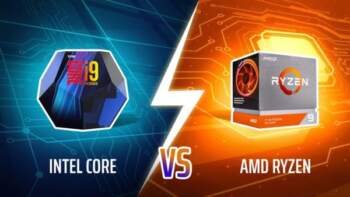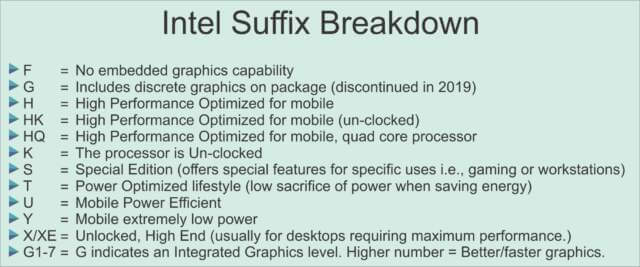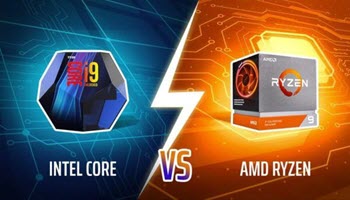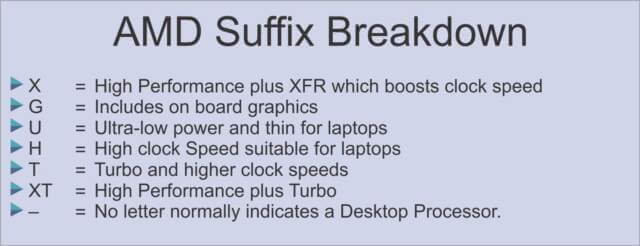What Processor Should I Buy?
It is important to plan when purchasing a new computer. Make sure that the components will not be outdated in a few years. That is important with components that are not easily switched out. If you plan for future improvements, it is easy to switch out the HD or memory. Most laptops have easy access panels for these upgrades. Not so with the CPU.
The two CPU suppliers, Intel and AMD and PC retailers don’t make it easy for consumers to understand which processor is best for their needs. In this article, I will show you how to check the specifications.
Intel vs AMD
Intel was the best choice for so long that most people still consider it the only option. AMD has made strides in recent years with its Zen Series of CPUs. Having an AMD CPU in your Computer is not a downside.
Intel CPUs
The Intel line of CPUs runs from the Celeron to their Core i3, i5, i7, and i9 series. I would rule out buying any brand of PC with a Celeron CPU even if it is Windows 11 ready. Most Celeron models are sold on “Home Shopping Networks” and pumped up as a great product. But the Celeron is at the bottom of Intel’s list for a reason. Their Core processors are a much better option.
Unlike cars where it is easy to see that 2021 is newer than 2020, the way CPUs are marketed and how they are listed by PC manufacturers makes it difficult to know which CPU you are getting. Both chip manufacturers do have labels that contain the specifications, but most retailers only list the CPU’s name.
Intel Labeling
Intel lists its Core CPUs by a modifier. You will see the modifier listed as “i3 or i7”, etc. When they update a modifier, they don’t change it. They add a series of numbers after the name. That number is called a “Generation”, followed by an SKU which adds additional modifications to that Generation and then a “Suffix” that indicates important aspects of that chip. Here is how to understand those numbers:
-
- The first number is called a “Generation”. An “i5 6500” is the 6th generation while an “i5 9500” is the 9thth. Two-digit generations are shown as “i5 10″. Higher generations are better
- The next numbers are called an SKU and indicate additional improvements to that generation, so for example, an “i5 5600” is an improvement on an “i5 5500”. Higher SKUs are better
- Finally, they may include a Suffix. Following is an abbreviated breakdown of CPU suffixes shown in the chart below:

- An Intel “10th generation or higher” i3 chip is better than a Celeron for about the same price. It can perform multiple tasks at once and even do entry-level gaming. For a desktop computer, I would move up to an i5 or i7 generation. The i7 is a faster chip and having the G7 or K feature will enhance its abilities. The i9 CPU is marketed to power users.
AMD CPUs
Most of the Intel CPUs are closely duplicated by their AMD counterparts. The Ryzen 3, 5, 7, and 9 are meant to match the corresponding series of the “Intel Core” series. The label is also like Intel’s.
AMD Labeling
AMD calls their graphics integrated CPUs as APUs. Intel just adds the Suffix G.
- With a Ryzen CPU the higher the number the more powerful the processor. An AMD Ryzen 9 3950x is better and faster than a Ryzen 7 The number in bold is the same as the generation number of an Intel CPU.
- The next numbers are SKUs, and they indicate improvements to that series, so for example, Ryzen 5 7000 is an improvement to a Ryzen 5 4000
- Following is an abbreviated breakdown of CPU suffixes shown in the chart below:
Without breaking down each Ryzen CPU, just be aware that a Ryzen 3, 5 7, and 9 is like Intel’s i-Core chips and you can expect a similar performance level.
*You may not see an actual label on the PC or online when you search the web. It may list the CPU as only an i5 processor. You might need to contact the seller and have them tell you the specifications for the CPU prior to your purchase.
Summary
Choosing the right CPU for your computing needs can be intimidating but there are a few key factors that can make your choice easier. Don’t worry about the manufacturer, they are close enough in quality and a PC with an AMD is often cheaper than its Intel counterpart. Ryzen 3s are slightly less robust than Intel i3 but after the 3 series they pair up pretty close. Remember that CPU numbers do carry a lot of information.
See other articles in this series:
- Purchasing Your 2022 Computer
- Purchasing Your 2022 Computer – CPUs ⬅ You are here
- Purchasing Your 2022 Computer – The CPU – Part 2
- Purchasing Your 2022 Computer – Memory
- Purchasing Your 2022 Computer – Storage
- Purchasing That 2022 Computer – Final Installment


Jim. I have noticed my newest computer draws/consumes more power when doing some tasks. Can hear the cooling fan kicking in also. Hope this means it draws less power when doing simpler tasks, Mindblower!
MB, really on high rendering programs like video editing, spreadsheets and I guess some games have the ability to increase the temp by heating up the CPU and memory and thereby start the fans. If you are overclocking it will do it also.
If you run Speccy and the temps are running cool and the fans are running, you might want to look in the BIOS to see if they can be set for a certain temp.
I don’t expect to need this article until 2025 when Win 10 stops being supported and I’m forced to get a new PC (thanks much, Microsoft!), but am sure I’ll be referring to the article then. Many thanks.
Thanks, Steve, check out my website for free help. I will always help if I can no matter where you live. I am building a newer version on WordPress so there is not a lot of updating going on be I do reply when someone needs help. Glad that you are part of DCT.
“I now run a small computer repair and service company focused on helping veterans and retirees in our area with computer and software training classes.” Wow, that sounds like something I could sink my teeth into. Wish you were in San Antonio, Jim.
This article has the same problem as just about every site out there. You don’t give any idea of what equivalent processors might be, For example, I currently have an i7 10700k and I have no idea what a comparable proc in the AMD lineup might be. This used to be explained, but if AMD wants my business back I am going to have to see some side-by-side comparisons.
Charles, you are absolutely correct. I could have gone into a much better comparison and truth be told I did. My first submission of this article was slightly more than twice as long. Breaking down the most common processors. In the end it was just too long and I feared it being too boring for the individuals that were not into that kind of breakdown. Whenever you wish to understand the equivalent covid processor you in AMD vs Intel, I strongly recommend visiting this site https://cpu-benchmark.org/ enter the i7 10 700k select compare and put in a similar AMD Ryzen series chip. Just be aware of the suffix to ensure you are not comparing a laptop to a desktop. I think I must have forgotten this link when I shortened the article. Thanks for the comment. It will be explained in the final installment of this series.
Charles, I don’t know what happened with my spell checker but that line starting with Whatever covid should not have been there, when you wish to understand the difference between Intel and AMD processors, visit that site.
Jim